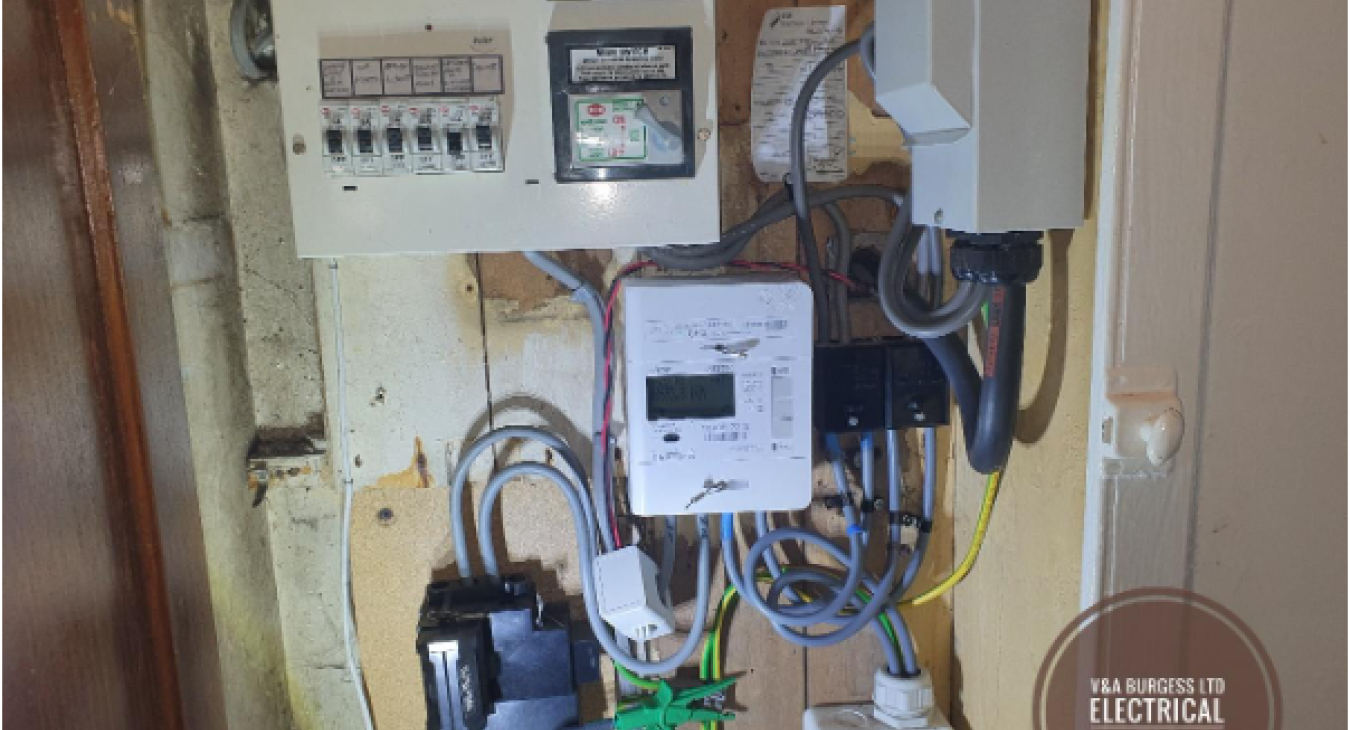Power Gone Off in House? A Comprehensive Guide for Homeowners - Electrical Faults Fixed
When the power goes off in your house, it can be a frustrating and sometimes even scary experience. As a qualified electrician with years of experience in fault-finding and repairs, I want to help you tackle these situations with confidence. This guide will walk you through what to do when the power has gone off in the house and how to prevent it from happening again.
Table of Contents
- Checking the Fuse Board or Electrical Panel
- Disconnecting Equipment Before Resetting
- Visual Inspections of Sockets and Switches
- Do NOT Remove Electrical Covers
- Smelling for Trouble
- What to Do in the Event of Total Power Outage
- Intermittent Power Outages and Their Causes
- Preventing Similar Issues in the Future
- The Importance of Electrical Maintenance
- What to Do Before an Emergency Electrician Arrives
- Frequently Asked Questions
1) Checking the Fuse Board or Electrical Panel
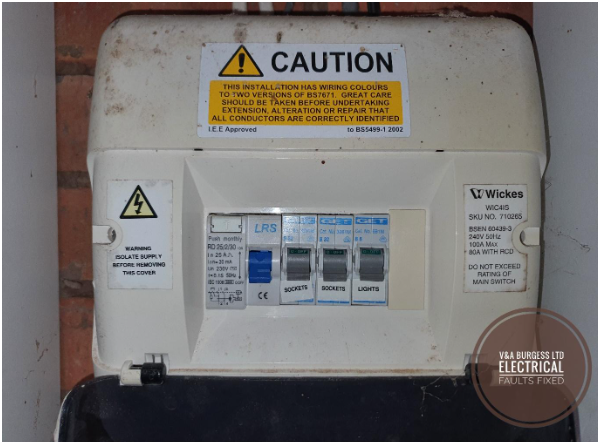
(PHOTO: An older consumer unit that should be regularly tested)
The first thing you should do when the power goes out is to check your fuse board or consumer unit (if you’re in the U.K.). Check your electrical panel (if you’re in the U.S.). This is where your circuit breakers or fuses are located, and it’s often the culprit when the power goes out in part of your house.
- Locate the Panel: Commonly found in basements, utility rooms, under the stairs or garages.
- Inspect the Breakers: Look for any breakers that appear in the “off” or middle position. These are tripped breakers.
- Reset the Breakers: To reset, flip the breaker fully to the “off” position before turning it back on.
If the main breaker is tripped, it could indicate a larger issue affecting your whole house. Most modern homes, in my experience, do not have an upfront breaker that will disrupt the power to everything these days. Modern consumer units are equipped with a main switch that is not designed to trip.
Back to top2) Disconnecting Equipment Before Resetting
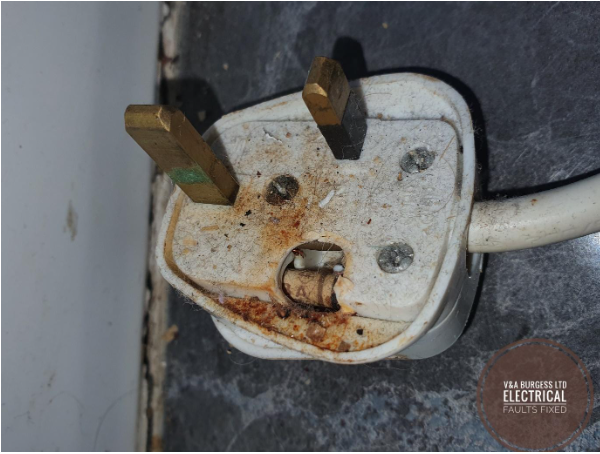
(PHOTO: A plug top that has overheated)
Before you reset any breakers, it’s a good idea to unplug devices or turn off appliances in the affected area. Why? Because overloaded circuits are a common reason for breakers to trip in the first place. Resetting a breaker while the same heavy load remains can cause it to trip again immediately.
- Unplug items like heaters, microwaves, extension leads or other high-energy appliances. These things can go faulty from time to time causing the power to trip off.
- Turn off the lights and other hardwired equipment to reduce the electrical load on the wiring system.
- Gradually plug devices back in after resetting the breaker. In some cases, this may work.
As a domestic fault-finding expert, I always recommend that customers disconnect all equipment before calling an emergency electrician. There is more connected equipment in your home than you will remember but it’s important to disconnect everything before attempting to reset the circuit breaker, RCD, GFCI or other trip switch. This is the first thing an electrician will do when they arrive to ensure they are dealing with a faulty circuit rather than a faulty appliance.
Back to top3) Visual Inspections of Sockets and Switches
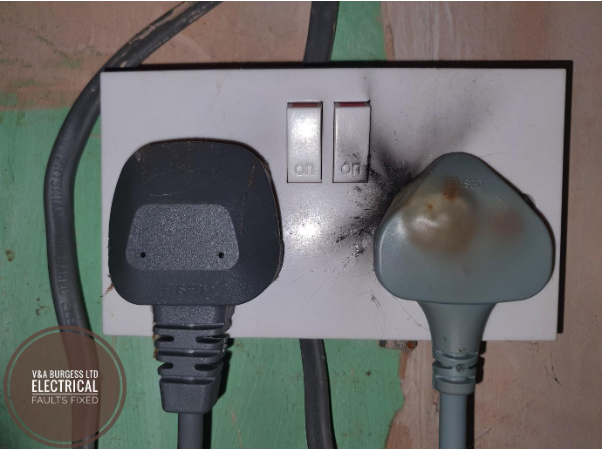
(PHOTO: A damaged plug socket outlet causing breaker to trip)
Once you’ve reset the breakers, take a moment to check your home’s socket outlets and switches for signs of trouble. Problems with specific outlets can sometimes cause power issues.
- Look for Damage: Check for burns, discoloration, or melted plastic near sockets.
- Loose Wires: Ensure plugs fit snugly and connections aren’t wobbly.
- Test GFCI Outlets: Press the reset button on any tripped GFCI receptacle.
4) Do NOT Remove Electrical Covers
Whilst it may be tempting to disconnect socket outlets, switches and even look inside the circuit breaker panel or consumer unit, do NOT attempt to work on electrical systems yourself. The risk of electric shock is real and only qualified persons should work on electrical systems.
There is no benefit to removing electrical covers and accessories unless a qualified electrician deems it necessary to do so. Electricians will have the correct test equipment and knowledge to understand electrical fault finding and will remove any covers they deem necessary.
Back to top5) Smelling for Trouble
If you notice a burning smell, take it seriously. It could signal a short circuit, overheated wiring, or even a fire hazard. Common places to check include outlets, switches, or the electrical panel.
- Immediately switch off the power to the affected circuit.
- Avoid using the area until a qualified electrician inspects it.
An electrical burning smell resembles a fishy smell. It is unmistakeable and incredibly pungent. The smell is caused by melting PVC insulation on wiring and plastics on electrical accessories and equipment.
Back to top6) What to Do in the Event of Total Power Outage
If your entire home has lost power, the issue might not be within your house. Here’s what to do:
- Check with Your Neighbors: Are they experiencing the same problem? If so, it could be a power company issue.
- Contact Your Utility Company: They can confirm outages or problems with the distribution network. Do an online search for your local network supplier. In the UK you can call 105 freephone.
- Inspect Your Electric Meter: Look for visible damage that might explain the outage.
In some cases, your neighbours may have power but you may not. This does not necessarily mean that the issue is with YOUR home electrical system. There could still be a problem in the street that only affects your property.
Back to top7) Intermittent Power Outages and Their Causes
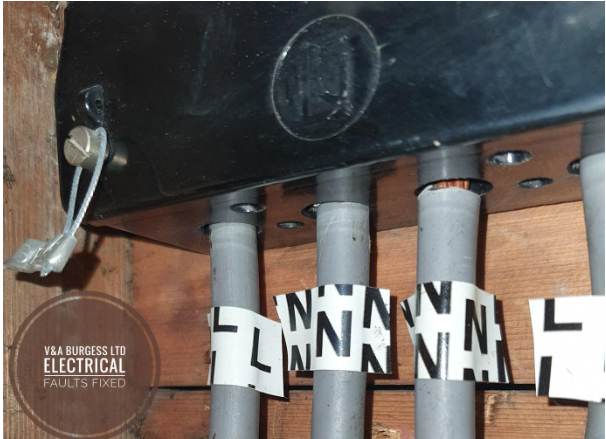
(PHOTO: Loose connections at the electricity meter)
If your power cuts in and out, it might indicate loose connections, damaged circuit breakers, or an overloaded circuit. As an example, loose connections at the electricity meter will cause intermittent and /or total power outage.
- Keep track of when the power goes off, it may occur when using higher powered appliances for instance.
- Check that light bulbs are properly screwed in and switches are working. Loose wiring in switches will cause a crackling noise.
- For recurring issues, have a licensed electrician perform a thorough inspection. This takes several hours but will show up high resistances that indicate loose connections.
8) Preventing Similar Issues in the Future
Taking preventive measures can help you avoid the stress of sudden power loss. Here are some tips:
- Use Surge Protectors: These prevent power surges from damaging your appliances.
- Upgrade Your Electrical Panel: Especially if you live in an older home, ensure your system can handle modern electrical loads and protects you from electrical shock sufficiently.
- Regular Maintenance: Schedule periodic inspections with a professional electrician to identify potential issues. Inspections should be carried out every few years.
9) The Importance of Electrical Maintenance
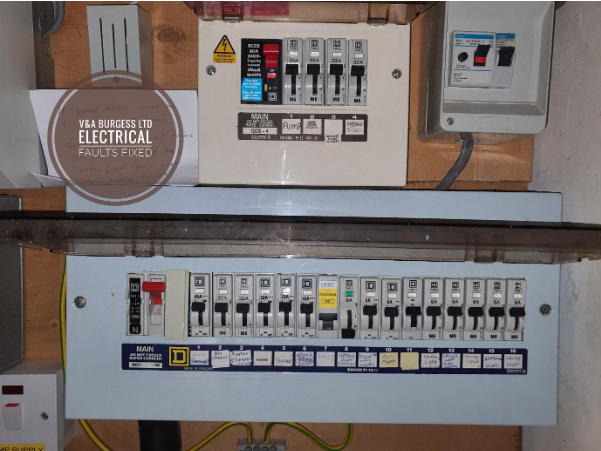
(PHOTO: Obsolete consumer unit equipment which is beginning to fail)
Regular electrical maintenance is essential for keeping your home safe and functioning smoothly. A professional electrician can identify loose wires, faulty wiring, and other potential hazards before they cause problems.
- Upgrade outdated wiring to meet current safety standards.
- Ensure your consumer unit or fuse box is in good condition.
- Test safety devices like GFCI outlets and RCD trip switches regularly.
10) What to Do Before an Emergency Electrician Arrives
If you’ve decided to call in professional help, there are steps you can take to make the process quicker and safer:
- Turn off the main switch if you suspect major wiring issues.
- Keep detailed notes on the affected area and what you’ve already checked.
- Make the area safe by unplugging appliances and ensuring clear access to the fuse box or circuit breaker panel.
If there is a fault on one of the electrical circuits in your home then your electrician may need further access to various switches, socket outlets and other electrical accessories in order to properly trace the fault.
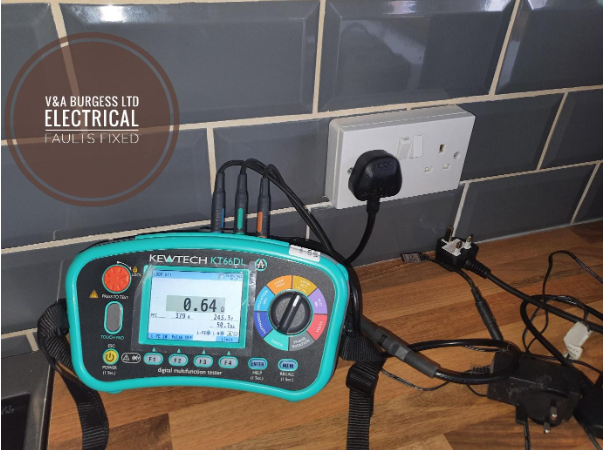
(PHOTO: Electrical testing is often carried out at sockets and breaker panels / consumer units)
Back to top11) Frequently Asked Questions
11.1) Why has the power gone off in the house but only in part of it?
This often happens due to a tripped breaker, loose wires, or an overloaded circuit. Start by checking your electrical panel and resetting any tripped breakers. Sometimes an RCD, RCB or GFCI device will supply power to several electrical circuits and when tripped, will disconnect much of the property from the electrical supply.
If the issue persists, contact a licensed electrician. Do not reset a breaker more than once in a short period without having the issues fully investigated. Neglecting to have issues checked will result in broken equipment and potential further expense.
11.2) Why do my breakers keep tripping?
Repeated tripping can indicate an overloaded circuit, faulty wiring, or a short circuit. Unplug high-energy devices and try resetting the breaker. If it still trips, call a professional for further inspection.
11.3) Can I reset a GFCI outlet myself?
Yes. Simply press the “reset” button on the outlet. If it doesn’t work, there could be a wiring issue or a ground fault that needs professional attention.
11.4) What should I do if there’s a total power outage?
Check with your neighbors and contact your utility company to confirm if it’s a widespread issue. Use battery-powered lights and cell phones to stay safe until the power is restored.
11.5) How can I prevent power issues in the future?
Regular maintenance, upgrading your panel, and using surge protectors are great ways to reduce the likelihood of power issues. It’s also a good idea to keep an emergency kit on hand for unexpected outages.
11.6) When should I call a professional?
Call an electrician if you notice burning smells, flickering lights, or repeated breaker trips. These could be signs of more serious electrical problems that require expert attention.
By following these steps, you’ll be better prepared to handle situations when the power has gone off in the house and take steps to prevent future occurrences. With a little preparation, you can ensure your home remains safe and powered up.
Back to top
Read more articles
- Log in to post comments

